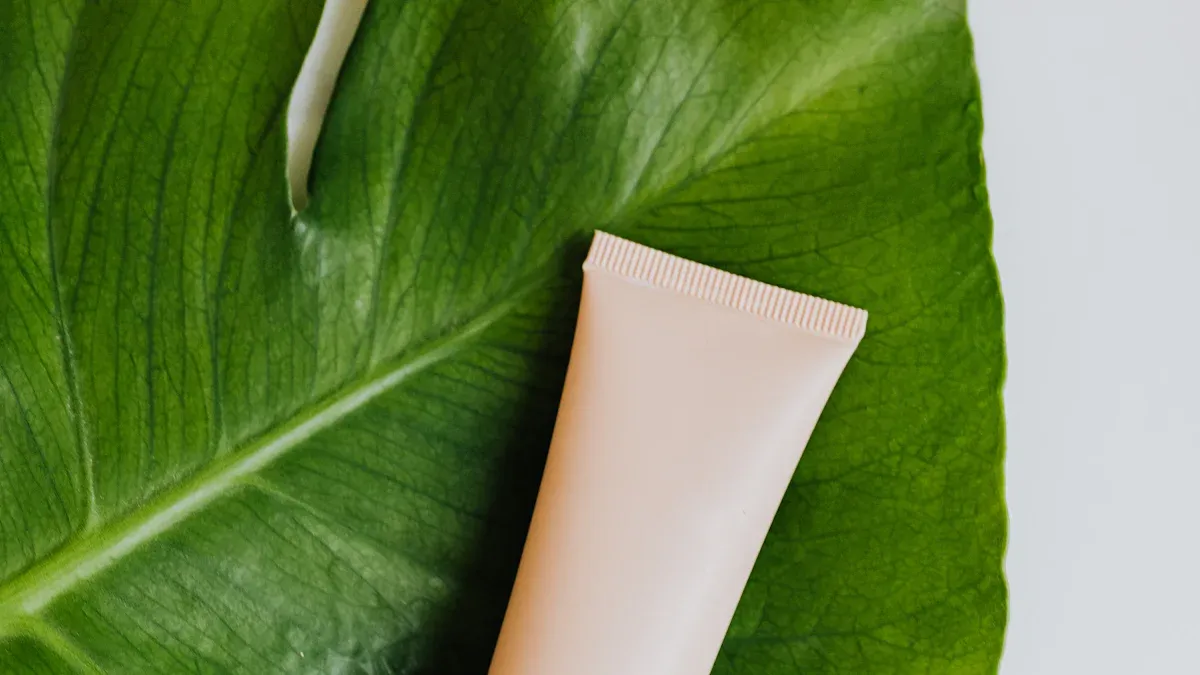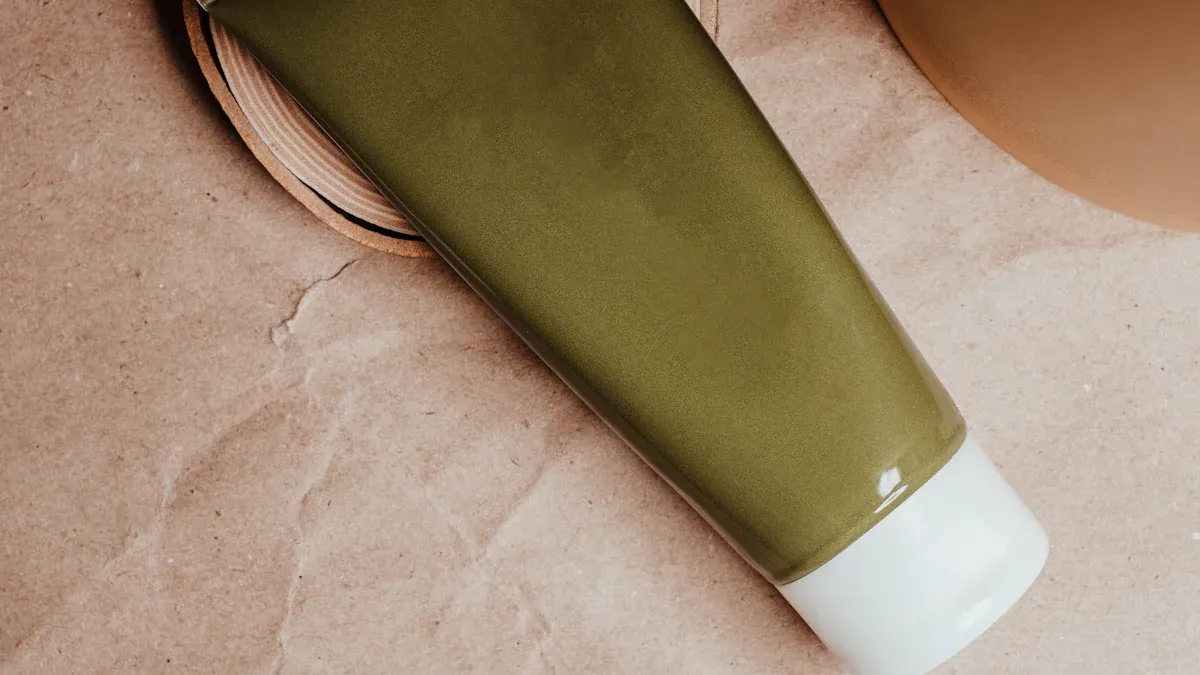Understanding Halogen-Free PET Shrink Tubing and Its Key Benefits

Halogen-free pet shrink tubing is a cover made from pet. It does not let out dangerous gases when it gets hot. This material is very strong and does not break easily. It also keeps electricity from leaking out. It does not catch fire easily. Pet heat shrink tubing starts to shrink at only 60ºC. This makes it safer and faster to use. Many companies use halogen-free pet shrink tubing. It keeps wires and parts safe and does not make poisonous smoke. The table below shows how pet heat shrink tubing works better than old materials:
Performance Advantage | Description |
|---|---|
Shrink Ratio | Pet shrink tubing can shrink up to 70%. This is much more than PVC. |
Shrink Temperature | It starts shrinking at a low 60ºC. This makes it quick and safe to use. |
Dielectric Protection | Pet heat shrink tubing keeps electric parts safe. |
Wear Resistance | Pet heat shrink tubing bends easily and lasts a long time. |
Halogen-free pet shrink tubing is safe for the environment. It is also strong and lasts long in electric and electronic uses.
Key Takeaways
Halogen-free PET shrink tubing is safe and tough. It protects wires and does not let out bad gases when heated. It shrinks at a low heat and fits wires tightly. It can resist fire, chemicals, water, and sunlight for a long time. PET tubing gives great electrical insulation. It stops shocks and short circuits in many devices. This tubing is good for the environment and lasts a long time. It meets strict safety rules for medical and industrial use. Many industries use PET shrink tubing for hard jobs. It fits well, lasts long, and keeps parts safe.
What Is Halogen-Free PET Shrink Tubing

PET Heat Shrink Tubing Composition
PET heat shrink tubing is made from polyethylene terephthalate. This plastic is both tough and bends easily. Companies pick PET because it does not have halogens. This makes it safer for people and nature. PET heat shrink tubing is special because it does not let out bad gases when heated. The tubing also stands up to chemicals and does not fall apart fast.
To make sure it is safe and lasts long, experts do many tests:
Thermal behavior tests see how the tubing acts with heat. They check the heat deflection temperature (HDT) to see if it keeps its shape.
Chemical resistance tests show if the tubing can handle different chemicals. This keeps wires and devices safe in hard places.
Density tests find out how much stuff is packed in the tubing. This helps make it strong but not heavy.
Barrier tests, like Water Vapor Transmission Rate (WVTR) and Oxygen Transmission Rate (OTR), see if water or air can get through.
Accelerated weathering tests show how the tubing holds up in sunlight and bad weather.
Experts say PET heat shrink tubing does not have PFAS, unlike fluoropolymer-based tubing like FEP. The right mix of chemicals and careful making, like melt extrusion, help make the tubing safe and good. Companies must follow rules and test their tubing to make sure it is safe and works well.
How It Works
PET heat shrink tubing starts out bigger than the wire or part. When you heat it, the tubing gets smaller and fits tight. This happens at a low heat, about 60ºC. The tubing makes a strong cover that keeps out dust, water, and chemicals. PET heat shrink tubing also stops electricity from leaking out. This helps stop short circuits. The tubing can shrink a lot, so it fits many shapes and sizes. Many people use halogen-free pet shrink tubing because it is safe and easy to use. Polyethylene terephthalate heat shrink tubing keeps wires and parts safe in electronics, cars, and other machines. PET shrink tubing does not break or wear out fast, even in tough places. PET heat shrink tubing gives strong protection and helps devices last longer.
Key Benefits
Safety and Flame Retardancy
Halogen-free flame-retardant heat shrink sleeve products made from pet heat shrink tubing keep people and equipment safe. When heated, pet does not let out harmful gases. This is important during fires or if things get too hot. The tubing does not catch fire easily and slows down burning. Many companies use pet heat shrink tubing to help stop fires. The tubing keeps its shape and stays strong, even when it gets very hot. This makes pet heat shrink tubing a good choice for places where safety is very important.
Tip: Halogen-free flame-retardant heat shrink sleeve choices help meet tough safety rules in public places and special areas.
Mechanical Strength and Durability
Pet heat shrink tubing is strong and lasts a long time. The tubing does not get cut or scratched easily. It does not break or crack, even if you bend or twist it. This helps protect wires and parts in rough places. Pet heat shrink tubing can last more than 20 years. It does not rust or get damaged by salt water, so it works well outside and near the ocean. The tubing works in both hot and cold weather. People do not have to replace it often. This makes pet heat shrink tubing a good pick for hard jobs.
Pet heat shrink tubing does not fade or get weak in sunlight.
The tubing can shrink a lot to fit many shapes and sizes.
It is easy to use and quick to put on.
Electrical Insulation
Pet heat shrink tubing gives great insulation for electric and electronic things. The tubing blocks high voltage and stops electric shocks. This keeps important devices safe, like medical tools and control boxes. The tubing also stops electricity from leaking out. These features show that pet heat shrink tubing works well for many voltages. The insulation keeps wires safe and helps stop short circuits. This is very important for jobs that need high safety. Pet heat shrink tubing keeps its insulation even when it gets hot or cold.
Note: Pet heat shrink tubing helps keep things safe and working well for a long time.
Environmental Impact
Pet heat shrink tubing is better for the environment. It does not have halogens, so it does not make bad gases when used or thrown away. This keeps workers and nature safer. The tubing keeps out water and dust, which helps protect electric and electronic parts. Because it lasts a long time, there is less waste. The tubing does not break down in tough places because it stands up to heat and chemicals. Pet heat shrink tubing meets many green rules and helps companies be kinder to the planet.
Pet heat shrink tubing lasts a long time, so you do not need to fix or replace it often.
The tubing keeps out water and dust, which helps electric and electronic things last longer.
Comparison with Other Tubing Types
Halogen-Free vs. Halogen-Containing
Halogen-free heat shrinkable sleeves and halogen-containing tubing both keep wires safe. But they are different when it comes to safety and the environment. Halogen-containing tubing can make bad gases if it burns. These gases can hurt people and break machines. Halogen-free tubing, like pet, does not let out these dangerous fumes. This makes it safer for places where people work or where there are strict rules.
A science study looked at how both types handle radiation. Halogen-free tubing, including pet, had medium resistance to radiation. Halogen-containing tubing had higher resistance, but it did not pass the same safety tests. Many companies now pick halogen-free tubing because it meets tough rules and keeps workers safe. Halogen-free tubing also handles heat better and bends more easily. These things make pet a top choice in cars, planes, and electronics. As safety rules get harder, more companies use halogen-free tubing to lower risks and help the planet.
Note: Halogen-free tubing helps companies follow new safety and green laws.
PET vs. Other Materials
Pet is different from other tubing materials. It is very strong and stands up to chemicals. Pet also stops electricity from leaking out. The table below shows how pet compares to other tubing:
Property | PET Tubing | Polyolefin Tubing | Elastomer Tubing | PVC Tubing | Fluoropolymer Tubing (e.g., PTFE) |
|---|---|---|---|---|---|
Tensile Strength | High | Lower than PET | Moderate | Moderate | High |
Shrink Ratio | 2:1 | Similar | Similar | Similar | Similar |
Dielectric Strength | >4,000 V/mil | Lower than PET | Moderate | Moderate | High |
Temperature Range | -196°C to 135°C (short-term 200°C) | Moderate (up to ~150°C) | -75°C to 150°C | Up to 105°C | Up to 260°C |
Chemical Resistance | Excellent | Moderate | Good | Poor to moderate | Exceptional |
Clarity | High | Moderate | Opaque | Moderate | Opaque or semi-transparent |
Elasticity | Low | Moderate | High | Moderate | Low |
Mechanical Strength | High | Moderate | Moderate | Moderate | High |
Cost | Moderate | Low to moderate | Higher | Low | High |
Pet tubing is clear, strong, and lasts a long time. Polyolefin and PVC cost less, but they do not last as long or protect as well. Elastomer tubing bends more, but it is not as strong as pet. Fluoropolymer tubing works in very high heat, but it costs a lot more and is not as clear as pet. Pet gives a good mix of strength, safety, and price for many jobs.
Electrical and Electronic Applications

Use in Components and Devices
PET shrink tubing is important in many electric jobs. Engineers use it to cover wires and protect parts. In hospitals, PET tubing covers catheters and tools. It meets tough rules like ISO 10993-5 and ISO 10993-10. These rules mean it does not hurt cells or skin. Medical teams trust PET tubing because it stays strong after cleaning with hydrogen peroxide. The tubing stays bendy after being cleaned by autoclave, plasma, or gamma rays.
Factories make PET tubing in cleanrooms. They keep good records to check safety and quality. Tests show PET tubing is safe to touch patients. This makes it a top pick for protecting medical device parts. In electronics, PET tubing covers wires and parts. It stops short circuits and keeps out dust and water. Technicians use PET tubing to cover connectors in computers and phones. The tubing also helps block chemicals and heat from hurting parts.
Industry Examples
PET shrink tubing is used in many jobs and fields. The table below shows how different industries use PET tubing for safety and protection:
Industry Sector | Application Examples in Device Components and Uses |
|---|---|
Medical | Covers for catheters, protects tools, insulates pacemaker parts, and stays strong after cleaning. |
Electronics | Organizes wires, stops short circuits, and protects parts in phones and computers. |
Industrial | Insulates machines, protects wires in tough places, and bundles cables. |
Telecommunications | Protects cables and wires in telecom systems. |
Automotive | Bundles wires, protects batteries, and insulates parts in engines. |
Aerospace and Defense | Manages cables, shields parts, and protects electronics from harsh conditions. |
Commercial & Residential | Adds insulation and safety in offices, stores, homes, and smart home systems. |
PET tubing is great for cars and factories. It protects wires from chemicals, heat, and water. In planes and defense, PET tubing keeps cables safe and covers sensitive parts. Hospitals use PET tubing for safe and lasting insulation. In all these areas, PET tubing works well and helps many electric and electronic jobs.
When to Choose PET Heat Shrink Tubing
Application Scenarios
PET heat shrink tubing is best for tough jobs. It works well where things need to last and stay strong. Many companies use this tubing in hard places. Engineers pick PET heat shrink tubing when there is heat, chemicals, or water. The tubing keeps wires and parts safe in cars, planes, and electronics. Medical tools also use PET heat shrink tubing. It is safe for people and can be cleaned many times.
Planes and cars use PET heat shrink tubing to keep cables safe.
Medical tools need tubing that can be cleaned and still work.
Electronics use PET heat shrink tubing to block dust, water, and chemicals.
Factories and outdoor places use PET heat shrink tubing because it stands up to sun, salt, and scratches.
Jobs that need things to work all the time, like control panels, use this tubing for its strength.
These examples show where PET tubing works best. The tubing fits tight and does not break easily. This makes it a good pick for hard jobs.
Selection Tips
Picking the right PET heat shrink tubing means matching it to the job. People should look at how much it shrinks, how thick it is, and what heat it needs. Most jobs work best with a shrinking heat of about 150°C. Using the right heater helps the tubing shrink evenly. The tubing lasts longer if you follow the maker’s rules.
Selection Factor | Why It Matters |
|---|---|
Shrink Ratio | Makes sure the tubing fits tight |
Wall Thickness | Helps the tubing stay strong and safe |
Temperature Range | Matches the tubing to where it will be used |
Chemical Resistance | Stops damage from oils and cleaners |
Adhesive Lining | Keeps water out in wet or dirty places |
If the job is wet or dirty, use PET heat shrink tubing with glue inside. People should check safety rules, like UL/CSA 224, to make sure the tubing is safe. Picking the right tubing helps it last long and work well every time.
Halogen-free pet shrink tubing is safe and strong. It protects wires and devices very well. Pet does not catch fire or make toxic gases. It lasts a long time in tough places. Pet keeps out water and dust, so things last longer. Pet is better for the planet because it has no bad chemicals. Many industries use pet shrink tubing. Pet gives good insulation. It is simple to put on and fits many shapes. Pet helps electrical and electronic work do better.
If you want to know more about pet shrink tubing, look at product guides or ask a supplier.
FAQ
What does "halogen-free" mean in PET shrink tubing?
Halogen-free means the tubing does not contain chlorine, fluorine, bromine, or iodine. These chemicals can release toxic gases during fires. PET shrink tubing keeps people and equipment safer by avoiding these harmful elements.
Can PET shrink tubing be used outdoors?
Yes, PET shrink tubing works well outdoors. It resists sunlight, water, and salt. The tubing does not fade or crack easily. Many industries use it to protect wires and cables outside.
How does PET shrink tubing protect against moisture and dust?
PET shrink tubing forms a tight seal when heated. This seal blocks moisture and dust from reaching wires or parts. Devices stay clean and dry, which helps them last longer.
Is PET shrink tubing safe for medical devices?
PET shrink tubing meets strict safety standards for medical use.
It does not harm skin or cells.
Hospitals use it to cover tools and wires because it stays strong after cleaning.
See Also
Essential Facts About PET Heat Shrink Tubing For Electronics
Importance Of Ultra-Thin PET Heat Shrink Tubing In Medicine
Advantages Of Using FEP Heat Shrink Tubing In Healthcare
Guide To Selecting The Best Ultra-Thin PET Heat Shrink Tubing
Differences Between Medical And Industrial Grade Heat Shrink Tubing

